An intriguing similarity between Glenn Close‘s Albert Nobbs and Damon Herriman‘s Bruno Richard Hauptmann in J. Edgar was mentioned earlier this morning by Rope of Silicon‘s Brad Brevet.

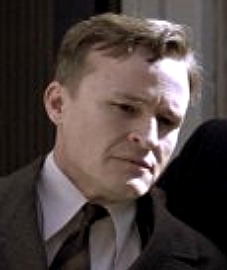
An intriguing similarity between Glenn Close‘s Albert Nobbs and Damon Herriman‘s Bruno Richard Hauptmann in J. Edgar was mentioned earlier this morning by Rope of Silicon‘s Brad Brevet.


In response to prohibitive security conditions announced by Summit Entertainment concerning its 11.16 Manhattan all-media screening of Breaking Dawn, critic Marshall Fine has declared the following: “As a critic who takes pride in his professionalism, I object to the forced surrender of my telephone or any other device at a screening to which I have been invited in a professional capacity. I therefore will not be attending this screening or reviewing this film.”

Most all-media screening publicists give special reserved tickets to journalists they know and trust so they won’t have to show ID or surrender their phones or submit to wandings or any of the other tedious procedures that security goons put people through at these events.
Will Fine make the same declaration if these same conditions are imposed for all-media screenings of War Horse or The Iron Lady or The Girl With The Dragon Tattoo? That is the question.
Journalist Mark Harris has joined Awards Daily’s Sasha Stone in declaring that in the wake of Brett Ratner’s “fags” comment last Friday, the Academy of Motion Picture Arts and Sciences should ask for his resignation as producer of the forthcoming Oscar show.
Gold Derby‘s Tom O’Neil seems to be in the Harris-Stone camp also, as indicated by his soliciting responses for a poll about whether Ratner should be canned.
Update: At 7:20 pm this evening Deadline‘s Mike Fleming reported that “the Academy of Motion Picture Arts and Sciences will not take action after Brett Ratner made and then apologized for making an insensitive comment during a Q&A for his film Tower Heist. AMPAS president Tom Sherak told Deadline he is standing behind Ratner after the filmmaker apologized for saying that ‘rehearsal is for fags.’ But Sherak made it crystal clear that another indiscreet comment will not be tolerated.”
As the Oscar telecast is “a show that is supposed to represent the best the industry has to offer, there’s not really a long, nuanced debate to be had about this,” Harris writes. “If [Ratner] had used an equivalent racial or religious slur, the discussion would go something like, ‘You’re fired.’ Apology or not. The same rule applies here. You don’t get a mulligan on homophobia. Not in 2011.”
Motion Picture Academy CEO Dawn Hudson faced a similar situation three years ago when, as the head of Film Independent, she was faced with gay community outrage after LA Film Festival director Rich Raddon was revealed to have contributed to the Mormon-led “Proposition Hate” initiative. Raddon submitted his resignation.
The above YouTube clip is an audio capture from Ratner’s appearance on today’s Howard Stern show. He spoke about he loves giving oral sex to women, about the Olivia Munn situation (he denied “banging” her), and spoke about having sex with Lindsay Lohan, and how a lot of his older Hollywood pallies don’t use condoms while sleeping with random women. Here are part 2 and part 3.
Robert B. Weide‘s Woody Allen: A Documentary will air in two parts as a PBS American Masters presentation on 11.20 and 11.21. The measure of it, for me, will be whether it accepts and explores the things in his life that were not wonderful, that didn’t go so well, that were somehow banal or involved discord or shortfalls. The less-than-triumphant stuff. Because relentless ass-kissing is not interesting.
I never said this when it was timely, but Allen’s decision to abandon Bop Decameron in favor of Nero Fiddles as the title of his latest film is one of the worst calls in his career. I loved the sound of Bop Decameron.
“In my next life I want to live my life backwards. You start out dead and get that out of the way. Then you wake up in an old people’s home feeling better every day. You get kicked out for being too healthy, go collect your pension, and then when you start work, you get a gold watch and a party on your first day. You work for 40 years until you’re young enough to enjoy your retirement. You party, drink alcohol, and are generally promiscuous, then you are ready for high school. You then go to primary school, you become a kid, you play. You have no responsibilities, you become a baby until you are born. And then you spend your last 9 months floating in luxurious spa-like conditions with central heating and room service on tap, larger quarters every day and then Voila! You finish off as an orgasm!” — Woody Allen.
I finally received my Mutiny on the Bounty Bluray today, and I have to tell the truth about it, which is more than what DVD Beaver‘s Gary Tooze and Bluray.com‘s Jeffrey Kauffman conveyed in their reviews. It looks better than the 2006 DVD, but not as good as it could have, given that this 1962 film was shot in 65mm Ultra Panavision.
I don’t mean to bite the hands that feeds, but the Mutiny Bluray simply doesn’t have the needle-sharp detail that you’ll find on the Ben-Hur or Ten Commandments Blurays. It’s pleasing enough, but it looks like it was derived from 35mm elements. I’ve read it’s from the same scan and transfer that constituted the 2006 HD-DVD disc.
The large-format sharpness and detail have never looked better on home video, yes. It’s better to have the Bluray version than the five-year-old DVD, of course. It’s just that the Bluray doesn’t convey how beautiful this film was when it was shown in 70mm roadshow engagements 49 years ago. I guess none of us will ever see a rendering on this level during our time on this planet.
The bottom line is that it would have been too expensive for Warner Home Video to do it really right, and I suppose, given the economic realities of the day, they had no choice. A digital scan of a 65mm film that lasts 178 minutes would have probably cost over $300,000, and perhaps a lot more. It just wouldn’t have made economic sense.
Yesterday morning Awards Daily‘s Sasha Stone and I riffed on Hugo, J. Edgar and Young Adult. Here’s a non-iTunes, stand-alone link.

Why was I, a non-fan of sadistic kick-ass actioners in the Jason Statham-Steven Seagal mode and a rabid hater of most Asian martial-arts flicks, so delighted with Steven Soderbergh‘s Haywire (Relativity, 1.20.12), and the fight sequences in particular? Answer: because they’re 100% believable, and because Gina Carano, an MMA champ, is the first completely credible female kick-butt star, ever.
Thirty seconds into her first duke-out and there isn’t the slightest doubt that Carano can whip any guy out there, no matter how big or snarly. If she could time-travel back to ’62 she could probably whip Sean Connery. Seriously. And she can act well enough. And she’s attractive.
There’s something almost stunning about the straight-up realism in Haywire‘s fight scenes. Or nostalgic, I should say. For as I mentioned last night, and as Soderbergh himself noted during last night’s post-screening q & a, the fight-scene realism is a kind of tribute to the train-compartment battle between Sean Connery and Robert Shaw in From Russia With Love (’63).
With their phony, fetishy, high-flying action-ballet bullshit, most Asian martial-arts films (efforts like Crouching Tiger, Hidden Dragon excepted) get it so completely wrong, for whatever reason not understanding or unable to deliver Haywire‘s simple aesthetic.
Soderbergh’s shooting and editing of the Haywire fight scenes is exquisite. Haywire is faster and more furious than Drive, but Soderbergh is clearly coming from the same “tone it down, think it through and make it real” school of action cinema. At no time do Haywire‘s action scenes give you that awful feeling of being artificially adrenalized and jacked-up for the sake of coherence-defying Michael Bay-o sensation.
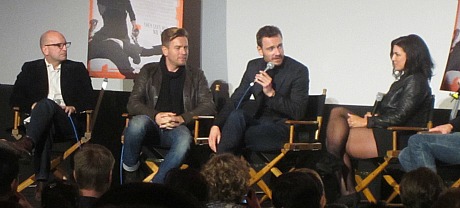
In a late August piece called Chaos Cinema, critic Mathias Stork lamented how modern action films “have become faster, volatile, over-stuffed, hyperactive…bipolar and promiscuous camera movement…a never-ending crescendo with no spacial clarity.” It is soothing to report that Haywire is pretty much the antithesis of this.
If you delight in chaos cinema (probably a fair description of the tastes of most filmgoers out there) then you might feel that Haywire doesn’t quite get it. But if you do feel this way, and if you tell your friends that it’s not as hot-shit as it ought to be, then you need to face the fact that you’re an idiot — that you have the moviegoing mentality (if not the physical proportions) of an Hispanic Party Elephant.
Haywire is a little hard to follow at first, but I presume that screenwriter Lem Dobbs wanted it that way. All I know is that I can’t wait to hear Dobbs and Soderbergh get into another commentary-track dispute (anything will do) when the Haywire Bluray comes out.
Carano’s Mallory Kane is an ex-Marine and independent contractor who’s on the run from several men who have some interest in or relation to an operation in Barcelona involving a Chinese defector or protestor of some kind. Mallory naturally has to elude or otherwise survive all the attacks upon her, or, as Soderbergh put it last night, she “beats her way through the cast.”
The able-bodied fellows who get the piss and the tar whipped out of them include Michael Fassbender, Channing Tatum, Ewan McGregor and Antonio Banderas.
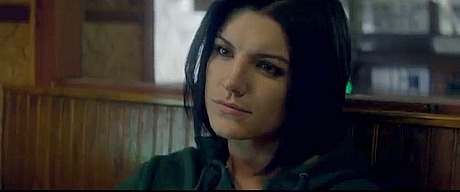
Michael Angarano, Bill Paxton and Michael Douglas also costar.
I don’t know that I buy the “Gina Carano is the new Pam Grier” line that some critics and columnists have used. I didn’t really buy Pam Grier as a serious toughie in her day; I believed that she played a serous toughie with great style.
There’s a great car-chase gag that happens at the midway point, involving an unfortunate non-human. That’s all I’m going to say.
I saw Hollywood Reporter columnist Scott Feinberg before last night’s earlier screening of My Week With Marilyn (which I’ll write about tomorrow or the next day, especially focusing on Michelle Williams‘ bulls-eye performance as Marilyn Monroe). I asked if he’d be seeing Haywire at 9:30 pm, and he said, “Well, it’s not an Oscar film and that’s my beat so no, not tonight. I’ll see it eventually but…” What a shame. For serious Oscar-beaters, the simple pleasure of buying a small popcorn and a drink and watching a thrilling, well-made film and going “whoo-whoo!” is on hold until after Oscar telecast, it seems. Well, not this horse.
I get into arguments with Sasha Stone about this. “Just saw a good one, it’s really great and you’ve gotta see it,” I’ll say to her. And she’ll say, “Yeah, okay, someday…but it doesn’t have much of a shot at getting nominated in any of the major categories and we’re right in the middle of Oscar season and this is what I do for a living so…” God!
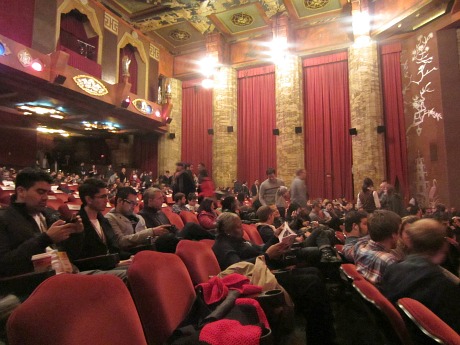
I received a spirited pitch this morning from a Rogers & Cowan junior publicist about interviewing “two amazing Christian women,” Chevonne O’Shaughnessy and Cindy Bond, about their company, Mission Pictures Int’l. The publicist described MPI as “a multi-faceted, value-based film distribution, sales and production company for both the mainstream and faith markets.” The plan, she said, is to deliver “trusted faith and family value-based content to the masses.”
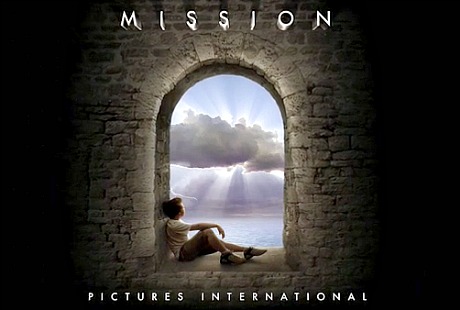
I replied as follows:
“When I hear the words ‘Christian’, ‘values-driven’, ‘faith-based’ and ‘family content’ I interpret that to mean that the movies being made by Mission Pictures International are quite possibly bland and mediocre and perhaps even obliquely ideological. I suspect that while they may be passable or entertaining in this or that respect they will almost certainly not be films of any real quality. I suspect, in short, that they might be more about what they don’t want to be (i.e., not in alignment with Hollywood callousness and cynicism and sensation-focusing) than what they are.
“I also suspect when I hear these terms, the person or mission being spoken of is fundamentally conservative (obviously) and therefore anti-liberal and quite possibly in alignment with the radical, nihilistic, batshit-deranged and corporate-serving Republicans and Tea Party-ers in Congress and elsewhere who use terms like ‘values’ and ‘faith-based’ and ‘Christian’ as a smokescreen to advance their anti-liberal, dumbshit, Republican-bubble, corporate-favoring views and beliefs among Middle Americans.
“So not only am I not interested in writing about Mission Pictures International, but I am inclined, as steel-trap-minded and knee-jerky as this sounds, to despise them without really looking into their films or who they really are. And I say this as a genuine fan of John Lee Hancock‘s The Rookie and The Blind Side and a lot of other nice, values-driven films about decent middle-class people from Middle America involved in decent, admirable and/or wholesome endeavors.
“I believe in fairness and decency and kindnesses and consideration, and I despise the rancid nature of most Hollywood actioners and CG-driven product, but I suspect a wolf in sheep’s clothing here. I will always suspect a wolf in sheep’s clothing when I hear the words ‘values-based.’ The values-based voters out there in Idiotland are the ones who gave us two terms of George Bush and brought in the 2010 conservative Congress that has blindly sided with corporate interests and have constantly impeded any chance of social progress.
“Q: What would you call 20,000 ‘values-based’ voters handcuffed, tied together with chain and thrown off a huge barge in the middle of the Pacific Ocean? A: A good start.
“May I suggest that Chevonne O’Shaughnessy and Cindy Bond beat a path back to whatever conservative bastion they came from and try to get some publicity from journalists in that neck of the woods? If they can produce a good John Lee Hancock-level film, I will watch it and perhaps applaud it. But otherwise I wouldn’t mind a bit if they failed. Not because of who or what they are, but because of who their friends and supporters are. And good riddance.
“Regards — Jeffrey Wells, Hollywood Elsewhere”
I told the publicist I would be posting this today, indicating that I was looking for a reply and/or a back-and-forth of some kind. She scurried away and hid like a churchmouse.
Last Friday night Tower Heist director and Oscar show producer Brett Ratner stepped into some p.c. poop, and he’s now trying to wash it off with one of those “whoops!…didn’t mean it that way” apologies. TheWrap‘s Sharon Waxman is reporting that when Ratner was asked by an audience member if he had rehearsed his cast, he replied that “rehearsal’s for fags.”
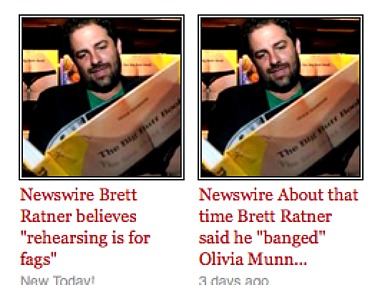
Ratner meant, of course, that rehearsal was for candy-asses, and that real men just get out there and hit their marks and say their lines, etc. But he wasn’t smart enough to say “candy-asses” and that’s why he’ll be in trouble for the next 24 to 72 hours. Because he indicated that his mindset and vocabulary are rooted on some level in the mid 20th Century homophobia alluded to Boys in the Band. (Ratner was born in ’69, a year after the play opened and a year before William Friedkin‘s film was released).
This is the same kind of thing that got Vince Vaughn in trouble when his character in The Dilemma said that energy efficient cars were “gay…not homosexual gay, but parents chaperoning your high school dance gay.” He meant that they weren’t maverick enough, that they were too obedient and kowtowing to the p.c. norm, that they lacked that studly, stand-alone Steve McQueen muscle-car aura. But he was also indicating that “gay” meant wispy and fluttery.
I’m too whipped to write anything about Steven Soderbergh‘s Haywire, which screened tonight at AFIfest to a wildly revved and delighted crowd. If the Sean Connery-Robert Shaw train compartment fight in From Russia With Love is your idea of a classic, Haywire will throttle you right down to the marrow. I’ve always felt that Angelina Jolie was too small and skinny to kick large male ass, but I believe in Gina Carano‘s aggressive abilities 110%.
Asian martial-arts films can go suck it on their knees, but this movie is the shit.
A bit more writing, another video and several photos tomorrow morning. But for now it’s safe to say that Haywire is the smartest, most genuinely thrilling and involving and satisfying kick-ass, faux-exploitation action thriller I’ve seen in a long time. Carano, bless her, beats her way through the entire male cast, and I believed each and every battle.
The above clip contains Soderbergh’s opening remarks before the film began.
Hollywood Reporter film critic Kirk Honeycutt, who’s been with the trade for a very long time, has been cut loose. Tough break. Can’t feel good. Honeycutt had been THR‘s first-string critic for…I can’t find a decent online bio but at least since the early Bill Clinton era, no? He was demoted to “international critic” status when THR honcho Janice Min hired former Variety critic Todd McCarthy a little more than a year ago.
Here’s hoping that Honeycutt, a knowledgable critic and a good writer, lands a suitable new gig in short order.
No Kirk Honeycutt recap will ever be complete without a mention of the Courtney Love Sundance incident (“What am I, a piece of shit?”). Love hit the roof when Honeycutt’s wife took a photo without asking, which prompted the actress-singer to snatch the camera. A People reporter wrote that Honeycutt “is said to have then grabbed the camera back from Love, prompting Love’s boyfriend, music exec Jim Barber, to jump the critic, who reportedly referred to Love as a ‘pig‘ (preceded by a very descriptive adjective),” etc.
Hollywood Elsewhere’s Tyrannosaur screening fund-raising campaign was kind of exciting while it lasted and I’m glad I did it, but you know what? Not that many people showed up. I was able to pay for three extra screenings on top of what Strand had booked so the people who needed to see this film would have a few more options, and at the end of the day the silence was almost deafening.
The Aidikoff screening on 10.27 lured about nine or ten journalists, the 10.31 showing at the Ocean Ave. Screening Room attracted three or four, and the third & final screening at the Sunset Screening Room on 11.2 played to five or six people. Several top-drawer Los Angeles journalists that I expected to see attend didn’t attend. So either they saw it at Sundance 2011 or LAFF 2011 last June, or they plan to see it at the 10 am screening at the Royal on 11.8, or they’ve figured some other way to catch it. It just feels like not that many people give a shit. I figured the “Olivia Colman as a deserving Best Actress or Best Supporting Actress” factor would attract a few more rsvps. But no.
If people have something better to do, you can’t stop ’em.